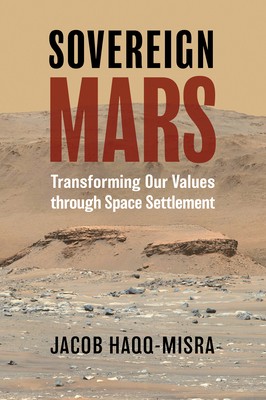
- We will send in 10–14 business days.
- Author: Jacob Haqq-Misra
- Publisher: University Press Of Kansas
- ISBN-10: 0700633901
- ISBN-13: 9780700633906
- Format: 15.4 x 22.8 x 2 cm, minkšti viršeliai
- Language: English
- SAVE -10% with code: EXTRA
Reviews
Description
The goal of sending humans to Mars is becoming increasingly technologically feasible, but the prospect of space colonization raises important questions about civilizational ethics and collective morality. History shows how destructive colonialism has been, resulting in centuries-long struggles to achieve liberation from the violent competition for land and resources by colonial powers. Space settlement poses the same temptation on a cosmic scale, with commercial actors and government space agencies doing the work previously carried out by European empires. The question is whether humans will take a different approach in this new frontier.
In Sovereign Mars, astrobiologist Jacob Haqq-Misra argues that settling Mars offers humankind a transformative opportunity to avoid the mistakes of the past by "liberating Mars" as a sovereign planet from the start. Rather than see space as a way to escape human problems on Earth, Mars presents humanity with a challenge to address these problems by thinking carefully about the theory and practice of civilization. Drawing on past examples of cooperative sovereignty, such as the Outer Space Treaty of 1967, the United Nations Law of the Sea Conventions, and the Antarctic Treaty System, Haqq-Misra begins a conversation about governance in space well in advance of the first arrival of humans on Mars and makes the case for an analogous approach to space that will preserve the space environment and benefit future generations.
Haqq-Misra examines the emergence of sovereignty in space through the lens of historical precedent on Earth and develops models of shared governance that could maximize the transformative potential of Mars settlement. Sovereign Mars proposes the planet would serve humankind best as an independent planetary state, a juridical peer to Earth, to enable new experiments in human civilization and develop a pragmatic model for shared governance on Mars.
EXTRA 10 % discount with code: EXTRA
The promotion ends in 22d.07:08:37
The discount code is valid when purchasing from 10 €. Discounts do not stack.
- Author: Jacob Haqq-Misra
- Publisher: University Press Of Kansas
- ISBN-10: 0700633901
- ISBN-13: 9780700633906
- Format: 15.4 x 22.8 x 2 cm, minkšti viršeliai
- Language: English English
The goal of sending humans to Mars is becoming increasingly technologically feasible, but the prospect of space colonization raises important questions about civilizational ethics and collective morality. History shows how destructive colonialism has been, resulting in centuries-long struggles to achieve liberation from the violent competition for land and resources by colonial powers. Space settlement poses the same temptation on a cosmic scale, with commercial actors and government space agencies doing the work previously carried out by European empires. The question is whether humans will take a different approach in this new frontier.
In Sovereign Mars, astrobiologist Jacob Haqq-Misra argues that settling Mars offers humankind a transformative opportunity to avoid the mistakes of the past by "liberating Mars" as a sovereign planet from the start. Rather than see space as a way to escape human problems on Earth, Mars presents humanity with a challenge to address these problems by thinking carefully about the theory and practice of civilization. Drawing on past examples of cooperative sovereignty, such as the Outer Space Treaty of 1967, the United Nations Law of the Sea Conventions, and the Antarctic Treaty System, Haqq-Misra begins a conversation about governance in space well in advance of the first arrival of humans on Mars and makes the case for an analogous approach to space that will preserve the space environment and benefit future generations.
Haqq-Misra examines the emergence of sovereignty in space through the lens of historical precedent on Earth and develops models of shared governance that could maximize the transformative potential of Mars settlement. Sovereign Mars proposes the planet would serve humankind best as an independent planetary state, a juridical peer to Earth, to enable new experiments in human civilization and develop a pragmatic model for shared governance on Mars.


Reviews